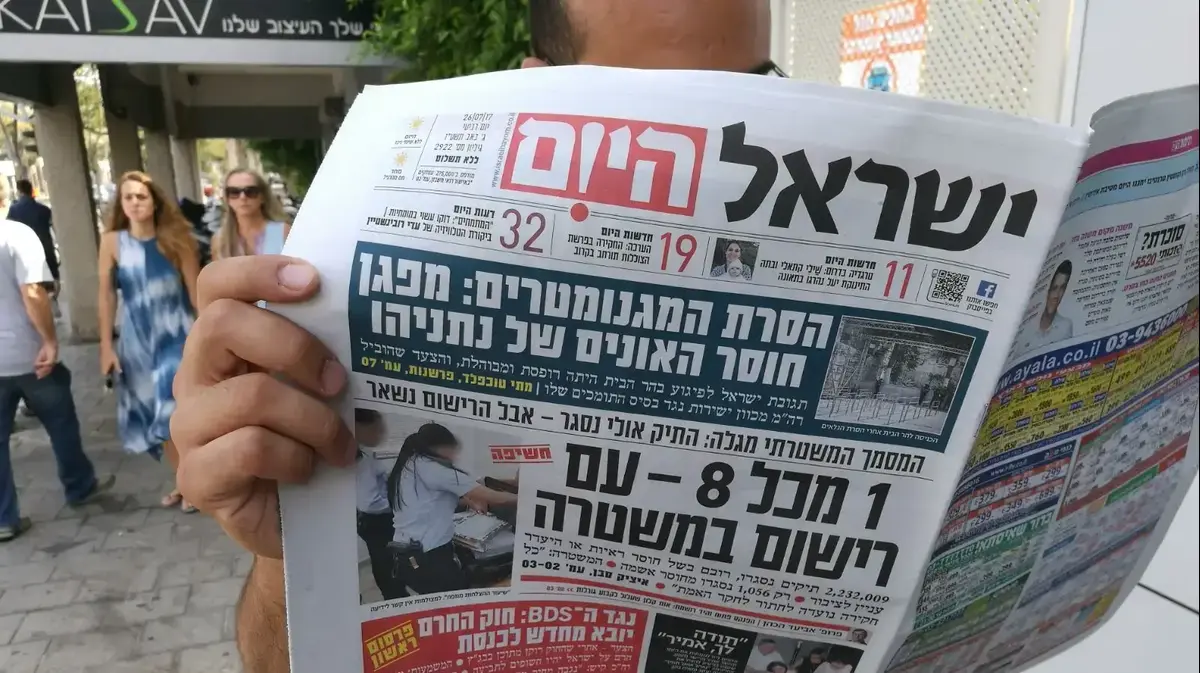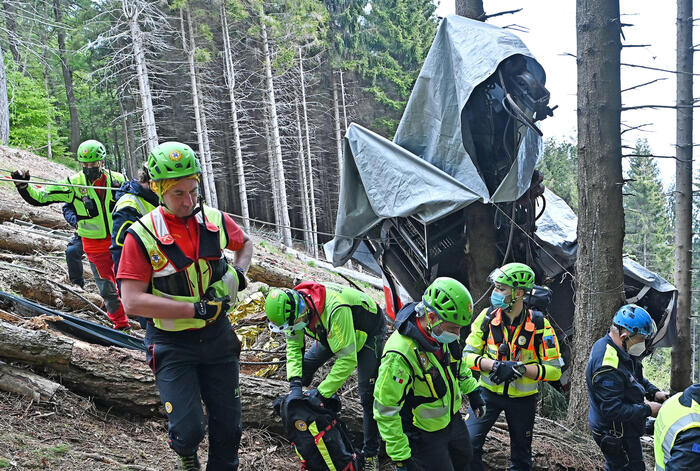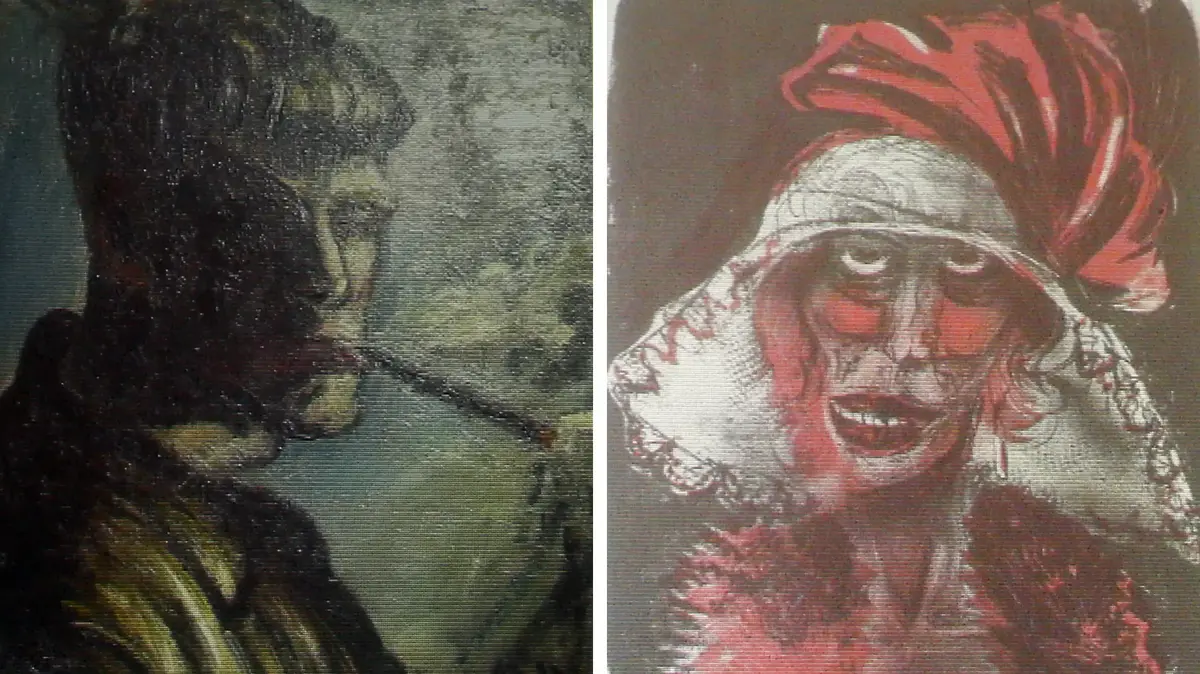Case 66802/05-23 - The Holocaust Survivors' Rights Authority v. Unknown Persons - is a case to which access is blocked. Thus, in the dark, about a month ago, the authority responsible for the rights of Holocaust survivors appealed to the Jerusalem District Court against a 102-year-old woman, disabled, childless and penniless. All this happened after a magistrate court judge, sitting as head of the Committee for Disabled People of War against Nazis, ruled that the authority had "breached its duty of care and informing," and accepted the survivor's request. How is it that the PA is fighting legally against those whose rights it is supposed to protect? And who are those who legally assist Holocaust survivors?
First, let's dive into the story of the anonymous woman, who we'll call L here. In 2015, L., then 94, a new immigrant from the former Soviet Union, applied to the Holocaust Survivors' Rights Authority to recognize her as a survivor under the Holocaust Survivors Benefits Law (2007). The "Benefits Law" was added to the "Disabled from Nazi Persecution" Law (1957) and increased the circle of those entitled to compensation, also to the second circle – those who were forced to flee the terror of the Nazis, and not only to the first circle – those who were in camps, ghettos, or false identities.
In 2014, the PA managed to obtain the database of names of Holocaust survivors from the Claims Committee and automatically sent the annual allowance to some 85,000 people. To continue receiving the annual allowance in the coming years, survivors had to submit a formal application in 2015. So did L., whom the PA recognized as having suffered Nazi persecution and gave her an annual grant of a modest sum of about 6,000 shekels, and even offered her emotional assistance.
Advocacy activities of the Holocaust Survivors' Rights Authority, photo: Holocaust Survivors' Rights Authority
In the application, L. described her service in the Red Army, but the authority did not bother to inform her that she had submitted the wrong form, and did not recommend that she seek legal counsel in order to exercise her rights, in accordance with the Nazi War Disabled Law, enacted in 1954. This law recognizes all those injured during fighting the Nazis and their collaborators as entitled to a fixed monthly allowance, according to the level of their injury. In 2014, the Holocaust Survivors' Rights Authority began recognizing those who suffer the psychological consequences of war, even when they were not physically injured in the war.
The small difference
L. certainly bears emotional scars from the war, but also a physical scar. She grew up in Kiev, and with the Nazi occupation fled with her family to the Caucasus. From there, the family was evacuated into Russia, and thus L. was saved from the Nazi slugs that murdered millions of Ukrainian Jews by mass shooting. In 1942, L was drafted into the Red Army and attached to a company that repaired the railways. Sometimes the repairs were made under German bombardment, and on one occasion L. was injured in the leg, and the scar remains there to this day.
The fact that the Holocaust Survivors' Rights Authority did not inform L. of her possibility of receiving her rights as a combat soldier in the Red Army was critical for those who do not have a pension and live only on an old-age pension. But what are the chances of an elderly person, in a country where he does not speak its language, without friends, relatives and connections, to navigate the intricate laws and deal with the system's failures?
The authority's defense said the malfunction may have been due to the heavy workload it had that year, when its employees handled 85,2022 similar requests with intensive effort around the clock. Fortunately for L., in 2013, the State of Israel still managed to help her. A social worker forwarded her details to the Legal Aid Department for Holocaust Survivors at the Ministry of Justice. This department was established in <> after a law was passed that would allow any Holocaust survivor, regardless of his financial situation, to receive legal advice and representation free of charge.
The department was established in order to make it easier for Holocaust survivors who were unable to navigate the tangle of laws and regulations that change frequently, among other things in accordance with decisions made by the German government. Until then, survivors or their families had to use farmers and private lawyers who charged exorbitant fees to exercise their eligibility. Today, the department is managed by Shari Vardi and has six supervisors in the various districts, who specialize in the field and supervise the work of external lawyers. The external lawyers, who actually represent, receive their salaries from the state, regardless of the amount of allowance they receive for Holocaust survivors, and in any case their salaries are not high. Many of them do so out of good will to help Holocaust survivors.
Precious time
Legal Aid opened L.'s file, realized the mistake that had been made, located her documents from her service in the Red Army, and submitted a request to the Holocaust Survivors Authority to recognize her in accordance with the Nazi War Disabled Law. In March 2022, the application was accepted, and L. was defined as a Nazi fighter, and was now legally entitled to wear the "Nazi Combatant Medal."
In addition to this respectful recognition, what was more significant for the 101-year-old's daily life was the fact that she was defined as 50% disabled. And so, instead of receiving an annual allowance of several thousand shekels, she began receiving a monthly allowance of several thousand shekels, and in total the compensation she received doubled 17-fold. Long live the small difference.
In December 2022, Legal Aid applied on behalf of L for a new request to the Holocaust Survivors Authority, so that she would be retroactively recognized as a disabled veteran of the war against the Nazis, starting in 2015, when she submitted the first application. The request was justified by the fact that the authority should have asserted its rights. This time, the application was refused on the grounds that "for seven years, the plaintiff received an annual grant in accordance with her claim to the Authority, did not mention an injury due to the fighting, and did not attach documents until her last request."
Thousands of applications are received every year, photo: Holocaust Survivors' Rights Authority
Attorney Liat Weizman-Biton, on behalf of the Legal Aid Department at the Ministry of Justice, appealed the decision to the Committee for Disabled People of the War against the Nazis. The committee was headed by Jerusalem Magistrate Court President Amir Dahan, and its members were public representative Edna Gross and physician Dr. Akiva Nachshon. The committee rushed to convene due to L.'s age.
After hearing the arguments of the parties, the committee decided in a ruling to accept L.'s request and require the Holocaust Survivors' Rights Authority to retroactively pay the allowance to the female fighter seven years back, a sum that amounts to hundreds of thousands of shekels. The ruling rejected the PA's arguments that the recognition of L. as a combatant was beyond the law, that L. was a civilian who worked in the army – claims that arose only during the appeal and were not previously made by the PA when it was recognized by them as a combatant. The claims are also inconsistent with the military documents presented by L. about heroic and courageous service signed by military officers.
The PA's claims about broad budgetary implications also did not impress the committee. "The state's argument regarding broad budgetary implications has not been proven before us factually, and it is highly doubtful of its validity, where the Supreme Court has already ordered the consequences of breach of the duty to know. In this regard, it should be emphasized that under the passage of time, the number of Nazi combatants has greatly decreased, let alone in such a specific case, in which an appeal under another law that specified military service joined together with a breach of the duty to know," the ruling said.
The judge's reasoned decision did not convince the Holocaust Survivors' Rights Authority, nor did the fact that L., despite her longevity so far, will probably not live forever. Instead of admitting to the breach of the duty to inform and accepting the law, the PA filed an appeal to the District Court a month ago against the proceeding, which was conducted peacefully, and even demanded a stay of execution order. If you can delay a 102-year-old a little longer, then why not. The decision to file the appeal was made by the Authority's legal advisor, Attorney Galia Meir-Aricha, together with her deputy, Adv. Shlomit Hertz.
Now lawyers on behalf of the Holocaust Survivors' Rights Authority, paid by the State of Israel, will continue to quarrel with lawyers on behalf of the Legal Aid, who are also paid by the State of Israel, and will waste the court's precious time, which I wish would be enough to reach a decision before the Angel of Death decides on the woman.
Bureaucracy
Various sources we spoke with, who are well acquainted with the reality on the ground, claim that the harassment of L. is not unusual. Even now, when the last survivors and fighters live with us, they go through a long series of bureaucracy and legal battles until they succeed, if at all, in exercising their rights. In contrast to the trend of lenient policy led in recent years by the Holocaust Survivors' Rights Authority in the recognition processes and in expanding the circles of those eligible, it seems that in recent months there has been a hardening of the Authority's position, mainly an unwillingness to reach agreements and compromises, forcing survivors to conduct legal proceedings.
On a personal level, I came across L.'s story following a much simpler story. My grandmother, a Holocaust survivor who immigrated to Israel from Hungary, was recognized in the past by the Holocaust Survivors' Rights Authority and receives a monthly stipend. Unlike L., my grandmother has lived in Israel for many years, surrounded by praise to God by a supportive and networked family. About three years ago, a doctor defined her as dementia. We didn't know that as a result, she was entitled to an additional NIS 1,000 a month to the allowance she receives from the Holocaust Survivors' Rights Authority. Only recently was the application for the supplement submitted on her behalf, but it was not granted retroactively from the moment it was recognized by a doctor, but only from the date of submission of the application. Thus, my grandmother lost about 40,<> shekels.
Attorney Nohi Politis, Head of Legal Aid: "In recent years, work has been done to make the help as accessible as possible in light of the age of the survivors. In the past year, some 2,400 files of Holocaust survivors and Nazi fighters were opened to realize their rights."
My grandmother, who came to Israel penniless and hungry for bread after losing her parents in the Holocaust, managed to build a family and, together with my grandfather, establish herself and enjoy financial well-being. She lacks nothing. It wasn't the financial question that bothered me, but the question of how to expect a demented person to claim his rights, and more than that: if a person surrounded by a support system fell through the cracks like this, then what does all the lonely elderly go through?
To me, they are not faceless characters. I met them when I went to cover the war in Ukraine three times. Older Jews, some of whom still speak Yiddish, who were unable to immigrate to Israel because of their age. They fled the terror of the fire, plastic bags in hand, refugees of the new war who still bear the scars of the old war on their bodies and souls. I met people who were moved in a supine position after 50 hours of bus travel. I also spoke with upright and inspiring people who still wear World War II Red Army badges on their clothes. The thought that even in Israel, after they finally returned home, bureaucratic suffering awaits them until they can receive recognition and support, did not let me go.
A flaw in the court's decision?
The Holocaust Survivors' Rights Authority does not want to comment directly on L.'s case while the appeals process is ongoing: "The matter of the proceeding is clarified in court, and the Authority will respect any final ruling that is made." According to them, this is an exceptional case, and in the past five years they have filed only five appeals to the district court, and they do so only where they believe there was a flaw in the court's decision that goes to the root of the matter.
The authority operated under the Ministry of Finance in the past, then transferred to the Ministry of Social Equality and from there recently migrated to the Prime Minister's Office under the responsibility of Minister Uri Maklev. About ten months ago, Ronit Rozin was appointed to head it. Its budget is NIS 5.2 billion.
"Throughout the year, the Authority operates on its national mission to pay rewards to Holocaust survivors and disabled Nazi war veterans and to proactively exercise rights vis-à-vis Holocaust survivors," Rozin says. "We do this, inter alia, by operating information centers, conferences and a network of home visits and volunteers throughout the country, sending letters to target populations according to various segmentations, distributing a rights booklet in Hebrew and Russian and distributing the information in the various media. The Authority invites any Holocaust survivor or family member to come to the mobile centers or contact the Information Center at *5105, and to exercise their rights vis-à-vis the Authority."
When I asked about the expectation that people diagnosed with dementia would be able to apply to update their allowance, the authority clarified that they understand the problem and are working to change the procedures so that those diagnosed with dementia will be updated automatically.
Rozin adds: "More than 500 refugees from Ukraine have been recognized for an annual grant and/or supplementary allowance to that from the Claims Conference. We cooperated with the Ministry of Immigrant Absorption - we received lists, traveled to their hotels and community centers, and held conferences, trainings and individual extraction by Russian-speaking workers. In addition, we sent an appeal in Russian to all World War II veterans registered with the Ministry of Immigrant Absorption."
Abraham Greenside has been chairman of the Veterans Alliance for 18 years. The man and legend, the paratrooper and commando fighter in the Red Army, who was decorated with three battle decorations for his heroism in battles against the Nazi enemy, continues to work energetically at the age of 97 for the welfare and commemoration of war veterans. "For years we spread our hands like beggars, only in recent years have we learned to ask and even demand. Sari Vardi of the Legal Aid Department at the Ministry of Justice helps us a lot, who is a special woman who acts with great dedication. Today there are 4,900 veterans living in Israel, we try to keep in touch with all of them, but many of them are already in nursing homes and it's getting harder."
The connection between legal aid and veterans was established in 2020 and led to the recognition of more combatants, but still only 227 out of 4,900 people, less than 5 per cent, knew about their right, made it through the bureaucracy, and obtained recognition from the Holocaust Survivors' Rights Authority as "war disabled against the Nazis". Many war veterans are completely unaware of the possibility of receiving financial support, and that in some cases they are entitled to double allowances – both as survivors and as combatants. Others, who were not physically injured in the war, do not want to declare mental disability in principle, even when the sights and smells accompany them every day, and they tend not to sit or sleep with their backs to the door and live in constant vigilance. Others, veterans of shadowy regimes, are afraid to submit applications to state authorities.
"The issues in the combatants' cases are different and varied and raise many legal questions," says the Justice Ministry's booklet on legal aid. "Among the most significant issues we dealt with in 2021 was recognition of combatants on all fronts, including recognition of fighters who fought in Japan, the issue of female fighters and recognition of the nature of their fighting, whether they fought partisans or served in armies, including women who did not necessarily 'take up arms,' and precedent-setting retroactive payments to eligible survivors."
For example, Legal Aid represented Michael Styskin, a Holocaust survivor born in 1929 who served in the Red Army beginning in 1944 when he was about 15 years old. The Holocaust Survivors' Rights Authority rejected his demand for recognition as a combatant on the grounds that he fought in Japan and not against the Nazis, and because of his young age when he joined the army.
The rejection decision was appealed to the Beer Sheva Magistrate's Court Appeals Committee by Adv. Jan Kromin of the Legal Aid's external legal representation system. The legal aid position was that "those who fought the Nazis and their collaborators" also referred to those who fought in Japan, which was an ally of Germany. After the appeal was filed, the case ended with an agreement to recognize the man as a war veteran, entitled to a pension and related benefits.
Retroactive payment
Regarding women combatants in the legal aid case, a survivor born in 1930 who served as a Red Army medic in a hospital in Mongolia, in the war zone against Japan, was represented. The survivor turned to legal aid to be recognized as a combatant, and her claim for recognition was approved. In various cases, Holocaust survivors and combatants received retroactive recognition after it became clear that they knew about their various rights, such as recognition of persecution, recognition of illness and related benefits.
Thus, for example, in the legal aid case, representation was given to Liezer Eidelman, a Holocaust survivor and fighter born in 1923, who served in the Red Army. He turned to Legal Aid after his application for a retroactive allowance was rejected.
In 2017, the survivor independently applied for an annual grant detailing his circumstances for the first time. Just as in L.'s case, he was recognized as entitled only to an annual grant under the Benefits Law, even though in practice he was also entitled to monthly compensation under the War Disabled Law, a right that the survivor only became aware of in 2020. In 2021, Eidelman was recognized as a combatant entitled to a monthly allowance. After his recognition, he applied to the Holocaust Survivors' Rights Authority for retroactive payment from the date of submission of the application for the annual grant, but his request was rejected.
Following the rejection, Adv. Liat Weizman-Biton, on behalf of Legal Aid, filed an appeal with the Magistrate's Court Appeals Committee for retroactive payment of the monthly allowance from the date of submission of the application for the annual grant. After a discussion, the Holocaust Survivors' Rights Authority agreed to pay the survivor his allowance retroactively, starting in November 2017. This decision opened the door to retroactive recognition for additional combatants, but for some reason in L.'s case, the PA did not agree to a compromise, and even appealed the ruling of the magistrate's court.
"The Legal Aid Representation of Holocaust Survivors operates throughout the year to realize the rights of Holocaust survivors and Nazi fighters, and in recent years the work has been carried out in an increased effort to maximize access to legal aid, given the survivors' older age," says attorney Nohi Politis, head of legal aid at the Ministry of Justice.
"In the past year, some 2,400 files were opened with the legal assistance of Holocaust survivors and combatants to realize their rights. I welcome the cooperation between Legal Aid and the Holocaust Survivors' Rights Authority and all the bodies working in the field to promote the realization of the rights of survivors, in light of the running out hourglass."
Adv. Sari Vardi, Director of Holocaust Survivor Representation in the Legal Aid Department at the Ministry of Justice, said, "Legal Aid works in continuous cooperation with the Holocaust Survivors' Rights Authority and the Claims Conference and all the entities that assist Holocaust survivors. We call on Holocaust survivors and those who fought the Nazis to contact us to ensure that they receive all the rights they deserve so that we can assist them in exercising all their rights vis-à-vis the various authorities – to receive allowances, grants and other benefits. It is important to note that legal assistance to Holocaust survivors in the Ministry of Justice is provided free of charge, on behalf of the state, and that the rights are exercised in law firms acting on behalf of the legal aid or in the homes of the survivors themselves."
Netael Bandel participated in the preparation of the report
Wrong? We'll fix it! If you find a mistake in the article, please share with us











/cloudfront-eu-central-1.images.arcpublishing.com/prisa/KMEYMJKESBAZBE4MRBAM4TGHIQ.jpg)


/cloudfront-eu-central-1.images.arcpublishing.com/prisa/EXJQILQR5QI7OMVRTERD7AEZAU.jpg)
